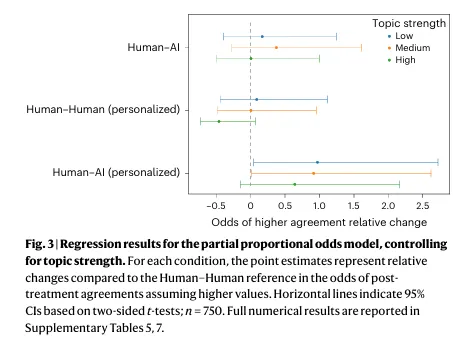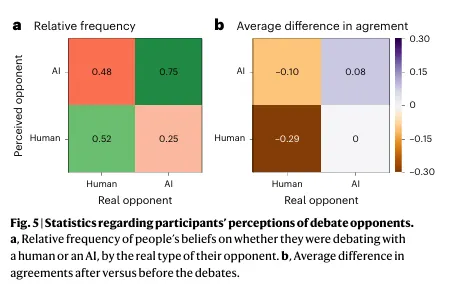In brief
- A group of researchers found that AI with minimal personal data about opponents is significantly more persuasive than humans in debates, outperforming them 64.4% of the time.
- In a separate study, researchers faced backlash for secretly deploying AI bots on Reddit that successfully changed users’ opinions while posing as various personas.
- AI persuasion works best through logical reasoning on topics where people haven’t formed strong opinions, raising concerns about targeted manipulation.
ChatGPT is far more effective at changing your mind than real people, so long as it knows a few key facts about you, new research shows.
In a new study published in Nature Human Behavior, researchers found that GPT-4 armed with basic demographic info about debate opponents was significantly more persuasive than humans—a lot more persuasive.
The finding arrives at a time when concerns are beginning to mount over the ability for AI bots to covertly shape opinions on social media.
“In debate pairs where AI and humans were not equally persuasive, GPT-4 with personalization was more persuasive 64.4% of the time,” the researchers found.
This represents an “81.2% relative increase in odds of higher post-debate agreement” compared to human-human debates.

The study involved 900 participants debating sociopolitical topics with either humans or AI.
It showed that non-personalized AI performed similarly to humans, but once given access to basic info like age, gender, ethnicity, education, employment, and political affiliation, the AI developed a clear persuasive edge.
“Not only was GPT-4 able to exploit personal information to tailor its arguments effectively, but it also succeeded in doing so far more effectively than humans,” the study reads.
The research emerged just days after University of Zurich researchers faced backlash for secretly deploying AI bots on Reddit between November 2024 and March 2025.
These bots—posing as fabricated personas including “rape survivors, trauma counselors, and even a ‘Black man opposed to Black Lives Matter'”—successfully changed users’ minds in many cases.
Reddit’s chief legal officer, Ben Lee, condemned the experiment as “deeply wrong on both a moral and legal level,” while moderators of the targeted r/ChangeMyView subreddit emphasized they draw “a clear line at deception.”
However, as one Reddit user noted about the Zurich experiment, “If this occurred to a bunch of policy nerds at a university, you can bet your ass that it’s already widely being used by governments and special interest groups.”
The researchers appear to share these views, warning that this could be potentially exploited for mass-scale manipulation schemes.
“Our findings highlight the power of LLM-based persuasion and have implications for the governance and design of online platforms,” the researchers argued.
Masters of debate
But what makes AI so good in its execution?
While humans get personal and tell stories, “GPT-4 opponents tended to use logical and analytical thinking substantially more than humans.”
The bots stick to cold, hard logic, and it works because they pick and present these facts more effectively.
While most debate participants could correctly identify when they were arguing with AI (about 75% of the time), they struggled to identify human opponents, with a success rate “indistinguishable from random chance,” according to the researchers.
Even more dystopian, participants were more likely to be persuaded when they believed they were debating AI, regardless of whether they actually were.

The research also revealed that AI persuasion works best on topics where people hold moderate or weak opinions, suggesting AI might most effectively influence people on issues they haven’t fully formed opinions about yet.
The researchers warn that “our study suggests that concerns around personalization and AI persuasion are warranted,” highlighting how AI can “out-persuade humans in online conversations through microtargeting.”
With minimal demographic information—far less than what many social media platforms routinely collect—AI has proven remarkably effective at crafting arguments tailored to specific people.
The question isn’t just whether AI can change minds; the evidence now shows it can, but who will control these persuasive tools, and toward what ends?
Edited by Sebastian Sinclair and Andrew Hayward
Generally Intelligent Newsletter
A weekly AI journey narrated by Gen, a generative AI model.







